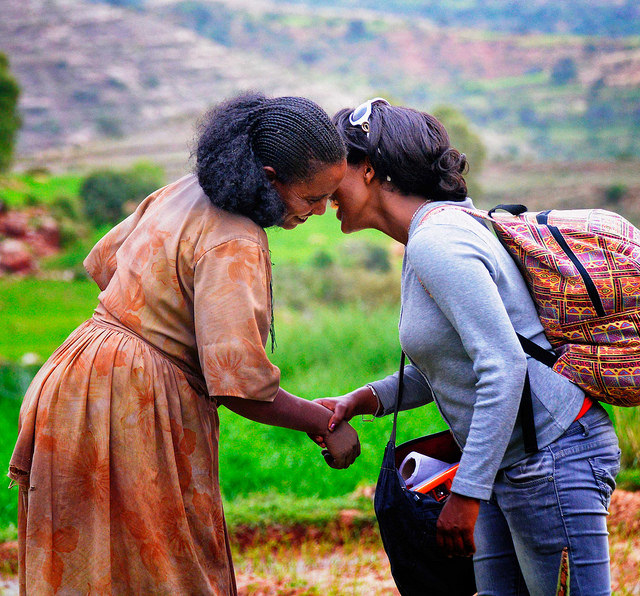
Walking down the street. On the bus. In a shop. I’m constantly greeted by ‘Good morning’ or ‘Good afternoon’ in Guyana. I like it, but as a Londoner, I’m quite disconcerted at being so visible. Are we not meant to pretend we can’t see each other?
I’ve tried it out. Calling ‘good morning’ when I step on the minibus. Nodding and greeting people strolling in my neighbourhood. But I’m still awkward. The words come out too fast, or too quietly. I feel I’m going through the motions if I say it stony faced, but disingenuous if I smile – like I know the person. So instead, I imagine, my face contorts into some kind of grimace.
This is only the half of it. I still have to try to figure out the system of addressing new people. “Call us Auntie and Uncle,” one Guyanese couple I met in London insisted. “That is Miss Sheila,” pointed out an acquaintance over here. “It’s ‘Miss’ not ‘Mrs’ – I’m not married,” corrected another.
Should I call everyone Mr, Mrs, Ms or Miss? Or just if they’re older? And how much older? I don’t want to cause offence (like I did referring to folks as ‘old’, before realising Guyanese people use the term ‘big’). And what if they start using their first name, is that a sign for me to switch or should I persevere?
So, once again, I rush and mumble and hope no one notices. At least we’re talking English here and I don’t have to think about formal conjugations like ‘usted’ in Spanish or ‘vous’ in French.
Of course we do use titles in the UK – in the classroom, in media reports, in certain work situations, when writing complaint letters… I also remember calling certain family friends ‘Auntie’ or ‘Uncle’ growing up, even though we weren’t related. And if you venture outside London, you will still find people saying ‘Good morning’ – sometimes even inside the capital, though usually only if you’ve got a dog or are out at the crack of dawn.
Formal addressing as a sign of respect is something I only really became aware of when I went to Ghana back in 2005. My colleagues would call our boss ‘Editor’. Mr, Mrs and Miss were frequently employed in greetings. As were ‘sir’ and ‘madam’. Then there were the elaborate and quite satisfying ‘clicking finger’ handshakes.
I was reminded of those days when I started working at BBC Africa a year or so ago. If you failed to say hello to a colleague and ask how they were, they would most probably pull you up on it later. “Well, you didn’t greet me earlier…”
Coming in, flopping at your desk and logging on without a word was not the way to do it. But being an anxious freelancer, always convinced I’m never working fast or hard enough, I worried about spending too much time talking. (‘It’s been minutes now, surely I should get back to work? Someone is probably watching me, thinking I’m skiving’).
So, is greeting etiquette really necessary? Is it outdated? Overly formal? I’m not so sure. As awkward as it is learning the ropes, especially as an outsider, maybe there’s something in it that we miss in London in our rush to treat everyone equally – and in our rush, fullstop. A recognition of the wisdom that comes with age. A nod of thanks to those who have paved the way for us. A gesture that says we can spare two minutes for you.
And if we start greeting strangers in the street and recognising them as people worthy of our time and respect – even as our brothers and sisters – perhaps that might filter into other areas of our lives. And that’s no bad thing.

In Germany too, you call everyone Herr or Frau soandso and use the formal form of you until there is mutual agreement on first names and the informal Du — which has to be invited by the older person, or the female person. And you do say Guten Moregen or Guten Tag to everyone you meet. As for Guyana— my son went to live there (from Europe) three years ago and ended up staying. He stays with a non-related “cousin” of mine in her mid-60’s and calls her Auntie J****. When I was growing up there you would address ALL grownups as Aunt or Uncle.
LikeLike
A mutual agreement on first names invited by the older person sounds like a good system. I would err on the side of caution and use ‘auntie’ and ‘uncle’ too but I’d worry it sounds too familiar – unless they suggest it or I know them through family. So I might persist with Mr and Mrs unless I’m corrected…
LikeLike
There’s much more hand-shaking as greeting and being called Frau Doble and nodding “Grüezi” (hello) to people on the street you pass here in Switzerland too. I mostly like it (but just call me Claire!) 🙂
LikeLike
Frau Doble, I love it. I can picture you inwardly seething!
LikeLiked by 1 person